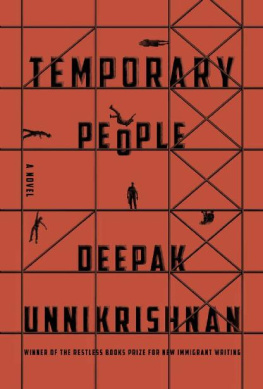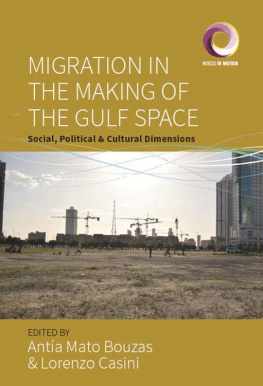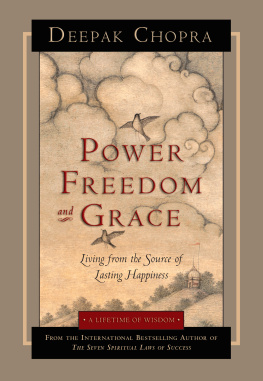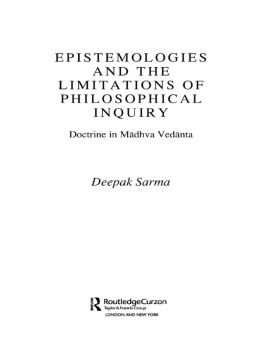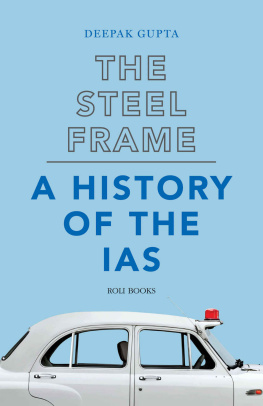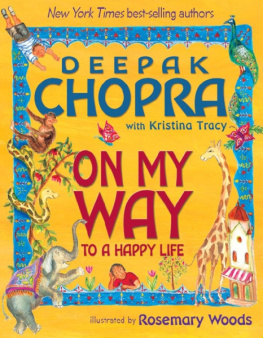Deepak Unnikrishnan - Temporary People
Here you can read online Deepak Unnikrishnan - Temporary People full text of the book (entire story) in english for free. Download pdf and epub, get meaning, cover and reviews about this ebook. year: 2017, publisher: Penguin, genre: Art / Science fiction. Description of the work, (preface) as well as reviews are available. Best literature library LitArk.com created for fans of good reading and offers a wide selection of genres:
Romance novel
Science fiction
Adventure
Detective
Science
History
Home and family
Prose
Art
Politics
Computer
Non-fiction
Religion
Business
Children
Humor
Choose a favorite category and find really read worthwhile books. Enjoy immersion in the world of imagination, feel the emotions of the characters or learn something new for yourself, make an fascinating discovery.
- Book:Temporary People
- Author:
- Publisher:Penguin
- Genre:
- Year:2017
- Rating:3 / 5
- Favourites:Add to favourites
- Your mark:
- 60
- 1
- 2
- 3
- 4
- 5
Temporary People: summary, description and annotation
We offer to read an annotation, description, summary or preface (depends on what the author of the book "Temporary People" wrote himself). If you haven't found the necessary information about the book — write in the comments, we will try to find it.
Temporary People — read online for free the complete book (whole text) full work
Below is the text of the book, divided by pages. System saving the place of the last page read, allows you to conveniently read the book "Temporary People" online for free, without having to search again every time where you left off. Put a bookmark, and you can go to the page where you finished reading at any time.
Font size:
Interval:
Bookmark:
Praise For Temporary People
Guest workers of the United Arab Emirates embody multiple worlds and identities and long for home in a fantastical debut work of fiction, winner of the inaugural Restless Books Prize for New Immigrant Writing. The authors crisp, imaginative prose packs a punch, and his whimsical depiction of characters who oscillate between two lands on either side of the Arabian Sea unspools the kind of immigrant narratives that are rarely told. An enchanting, unparalleled anthem of displacement and repatriation.
kirkus reviews , starred review
Inventive, vigorously empathetic, and brimming with a sparkling, mordant humor, Deepak Unnikrishnan has written a book of Ovidian metamorphoses for our precarious time. These absurdist fables, fluent in the language of exile, immigration, and bureaucracy, will remind you of the raw pleasure of storytelling and the unsettling nearness of the future.
alexandra kleeman, author of you too can have a body like mine
Inaugural winner of the Restless Books Prize for New Immigrant Writing, this debut novel employs its own brand of magical realism to propel readers into an understanding and appreciation of the experience of foreign workers in the Arab Gulf States (and beyond). Through a series of almost thirty loosely linked sections, grouped into three parts, we are thrust into a narrative alternating between visceral realism and fantastic satire.... The alternation between satirical fantasy, depicting such things as intelligent cockroaches and evil elevators, and poignant realism, with regards to necessarily illicit sexuality, forms a contrast that gives rise to a broad critique of the plight of those known euphemistically as guest workers. verdict : This first novel challenges readers with a singular inventiveness expressed through a lyrical use of language and a laser-like focus that is at once charming and terrifying. Highly recommended.
henry bankhead, library journal , starred review
Unnikrishnans debut novel shines a light on a little known world with compassion and keen insight. The Temporary People are invisible peoplebut Unnikrishnan brings them to us with compassion, intelligence, and heart. This is why novels matter.
susan hans oconnor, penguin bookshop (sewickley, pa)
Deepak Unnikrishnan uses linguistic pyrotechnics to tell the story of forced transience in the Arabian Peninsula, where citizenship can never be earned no matter the commitment of blood, sweat, years of life, or brains. The accoutrements of migrationlanguages, body parts, passports, losses, wounds, communities of strangersare packed and carried along with ordinary luggage, blurring the real and the unreal with exquisite skill. Unnikrishnan sets before us a feast of absurdity that captures the cruel realities around the borders we cross either by choice or by force. In doing so he has found what most writers miss: the sweet spot between simmering rage at a set of circumstances, and the circumstances themselves.
ru freeman, author of on sal mal lane
Unafraid to experiment with literary form, Unnikrishnan writes stories that examine the experience of immigration, emigration, identity and exile in the Gulf and India from a uniquely South Asian perspective. Born in Kerala, he was brought to Abu Dhabi as an infant and lived here until 2001, when he moved to study in the US.... His surreal and hallucinatory style, which also defines his other short stories such as Water and How Sharjah Mohan Took the Men, have drawn comparisons with the magical realism of Salman Rushdie and the satirical humor of George Saunders, but as the title of Gulf Return suggests, Unnikrishnans work reflects on issues that are simultaneously global and specific to the experience of NRIs, long-term non-resident Indians, not just in the UAE but throughout the wider Gulf.... In Unnikrishnans fiction, as in his life, the experience of migration is one that is both heightened and illusionary, and the sense of home he illuminatesso very different from the mythic, Homeric modelcan never really be returned to or relied upon to offer any sense of consolation. As such his work represents a literary response to the issues discussed in Neha Vohras sociological study Impossible Citizens: Dubais Indian Diaspora , while belonging to a new but growing genre of Khaleeji literature, including Saud Alsanousis The Bamboo Stalk and Mia Alvars In the Country , that Unnikrishnan hopes will provide a more nuanced picture of migrant life in the Gulf.
nick leech, the national (uae)
Deepak writes brilliant stories with a fresh, passionate energy. Every page feels as if it must have been written, as if the author had no choice. He writes about exile, immigration, deportation, security checks, rage, patience, about the homelessness of living in a foreign land, about historical events so strange that, under his hand, the events become tales, and he writes tales so precisely that they read like history. Important work. Work of the future. This man will not be stopped.
deb olin unferth, author of revolution
From the strange Kafkaesque scenarios to the wholly original language, this book is amazing on so many different levels. Unlike anything Ive ever read, Temporary People is a powerful work of short stories about foreign nationals who populate the new economy in the United Arab Emirates. With inventive language and darkly satirical plot lines, Unnikrishnan provides an important view of the relentless nature of a global economy and its brutal consequences for human lives. Prepare to be wowed by the immensely talented new voice.
hilary gustafson, literati bookstore (ann arbor, mi)
Absolutely preposterous! As a debut, author Unnikrishnan shares stories of laborers, brought to the United Arab Emirates to do menial and everyday jobs. These people have no rights, no fallback if they have problems or health issues in that land. The laborers in Temporary People are sewn back together when they fall, are abandoned in the desert if they become inconvenient, and are even grown from seeds. As a collection of short stories, this is fantastical, imaginative, funny, and, even more so, scary, powerful, and ferocious.
becky milner, vintage books (vancouver, wa)
There is much to admire in Unnikrishnans fanciful and fervent debut, a collection of stories about the lives of guest workers in the United Arab Emirates. Unnikrishnan explores the depredations, sorrows, and longings of these foreign laborers, who are often treated as disposable, with a dark whimsy.... Interspersed throughout are briefer pieces, from one paragraph to several pages in length, concise meditations that offer up the books best expressions of what it means to be an outsider in a land far from home.
publishers weekly
Unnikrishnan tells [his] stories in experimental prose that moves from vignettes that read like mythical texts to transcribed interviews. The most compelling writing renders the characters plights in the abstraction of magical realism. A careful, patient reader will love Unnikrishnans inventive and caring connected tales.
frank tempone, booklist
Please, if you care for my opinion, read this writing of Deepak Unnikrishnan and support him. He is a magnificent fellow with an intricate and beautiful mind; this work he does now, already wonderful, is but the smallest part of what he will do in time.
jesse ball, author of silence once begun
This is a fascinating, difficult, and chaotic read, but I couldnt put it down. Its linked stories, myths, or allegories examine the condition of the guest-worker subclass (but they are a silent majority) in the Gulf states, where nary an Arab worker is to be found. It gets an A+ for language play and for illuminating a sore point of social injustice that any visitor to the United Arab Emirates would have seen, if not understood.
darwin ellis, books on the common (ridgefield, ct)
Next pageFont size:
Interval:
Bookmark:
Similar books «Temporary People»
Look at similar books to Temporary People. We have selected literature similar in name and meaning in the hope of providing readers with more options to find new, interesting, not yet read works.
Discussion, reviews of the book Temporary People and just readers' own opinions. Leave your comments, write what you think about the work, its meaning or the main characters. Specify what exactly you liked and what you didn't like, and why you think so.

